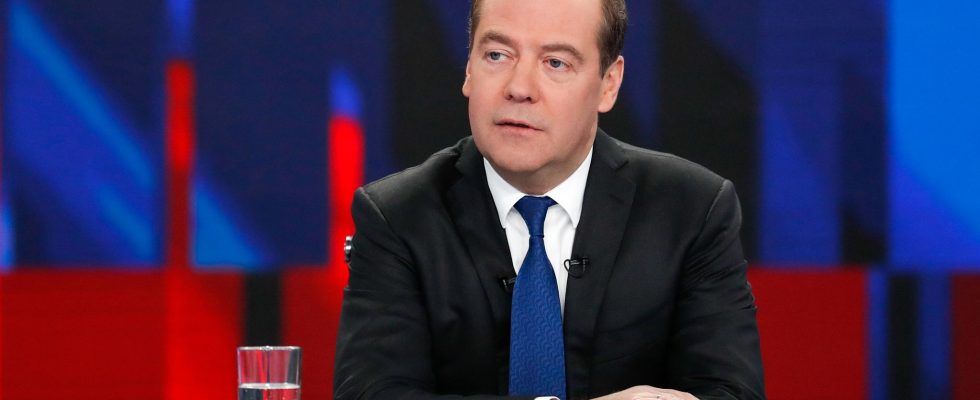Hungary, Poland, Slovakia and the Czech Republic called on Tuesday, September 26, the European Union to ensure the perfect efficiency of the land corridors used by Ukrainian cereals. Officials from the Ministries of Agriculture of the four Central European countries have in fact reaffirmed that part of the grains transported remain in the countries crossed, such as Poland, with a disadvantage for local farmers, because they are much cheaper than those produced locally.
“We ask the European Commission to more actively verify the effectiveness of these solidarity corridors,” Czech Agriculture Minister Marek Vyborny told journalists. “Our common interest is to help transport Ukrainian grain, normally outside the EU, and we need the corridors to contribute effectively to this,” he added.
Dmitri Medvedev says he visited eastern Ukraine
Former Russian President Dmitry Medvedev, number two on his country’s Security Council, said Tuesday he had visited a military training site in eastern Ukraine. “I visited the training site near the front line on the territory of the DNR (Donetsk People’s Republic) on the orders of President” Russian Vladimir Putin, declared Dmitry Medvedev in a video posted on the Russian social network VKontakte.
His inspection showed that the training provided on this site was “adequate”, and that the troops demonstrated “will”, “firmness” as well as “a victorious spirit”, he welcomed. Since the start of the conflict, several senior Russian officials have visited Ukraine. Vladimir Putin, for example, made a surprise visit in March 2023 to Mariupol, a city devastated by bombings in southern Ukraine, then went last April to the Lugansk region, in the east of the country.
Dmitri Medvedev also announced that the Russian army had recruited more than 325,000 people since the start of the year, 45,000 more than the previous figures dating from the beginning of September. From January 1 to September 26, “more than 325,000 people were accepted” into the armed forces, he said.
Since the spring, the Russian army has been carrying out a vast voluntary recruitment campaign, with a lot of advertising in the streets and on the Internet, promising particularly attractive salaries and social and banking benefits to future soldiers.
EU: opening of accession negotiations with Ukraine imminent?
European Parliament President Roberta Metsola hopes to see the EU open accession negotiations with Ukraine and Moldova by the end of the year. During an interview on Tuesday with the “European Newsroom”, bringing together European press agencies including AFP, the Maltese official was questioned about the 2030 date proposed by Council President Charles Michel for EU enlargement. .
“Rather than focusing on the date – let’s say it’s good that there is a date on the table – let’s focus on hopefully opening accession negotiations by the end of the year,” said Roberta Metsola (PPE group, right). “If Ukraine and Moldova are ready, accession negotiations should be able to start and steps could then be taken gradually, step by step,” she continued. “Every country follows its own path, but let’s not disappoint the millions of people who consider Europe their home,” urged the President of the European Parliament.
The President of the European Parliament has always shown her support for Ukraine and its accession to the EU. She was the first head of an EU institution to visit Kiev, in April 2022, after the start of Russia’s invasion of the country. In June 2022, the EU granted candidate status to Ukraine, in a highly symbolic gesture, as well as to Moldova. On the other hand, it refused this status to Georgia, demanding more reforms from Tbilisi.
To take the next step of opening accession negotiations, the European Commission has defined seven benchmarks for Kyiv. These are conditions to be met, particularly in terms of the fight against widespread corruption and judicial reforms. In an interim assessment in June, the Commission assessed that two criteria were met and the other five were “at some level of progress”.
The death of the commander of the Russian fleet in the Black Sea denied by Moscow
The Russian Defense Ministry released an image on Tuesday showing Viktor Sokolov, commander of the Black Sea fleet, participating in a video conference, after Ukraine claimed to have killed him. In the photo, the official appears on a large screen, alongside other senior military officials attending a meeting chaired by Defense Minister Sergei Shoigu. A statement, which does not mention the officer’s name, indicates that this meeting took place on Tuesday. The officer appears to have a large white cushion or armchair behind his back. In a video released later, the commander appears in the image several times, without speaking.
Ukraine struck the headquarters of the Russian Black Sea Fleet in Sevastopol, a city in Crimea annexed by Russia, with missiles on Friday, September 22. On Monday September 25, the Ukrainian army claimed that among the thirty officers killed in the strike was Commander Sokolov. But, after the publication of the images of Viktor Sokolov, Ukrainian special operations forces announced on Tuesday that they were “clarifying” their information.
These forces affirmed on Telegram that, according to “available sources”, the commander was among the dead, although identification of the victims was difficult because the bodies were very damaged. “As the Russians were forced to urgently publish a response purporting to show Sokolov alive, our services are clarifying the information,” they said.
Russia, which almost never gives information on its military losses, has for its part only given a report of one person missing following the bombing. Moscow has not commented on the Ukrainian claim, with the Kremlin remaining very vague on Tuesday about the fate of the commander. “There is no information on this subject from the Ministry of Defense,” Dmitry Peskov, the spokesperson for the Russian presidency, told the press. “We have nothing to say,” he added, referring to the Ministry of Defense.
